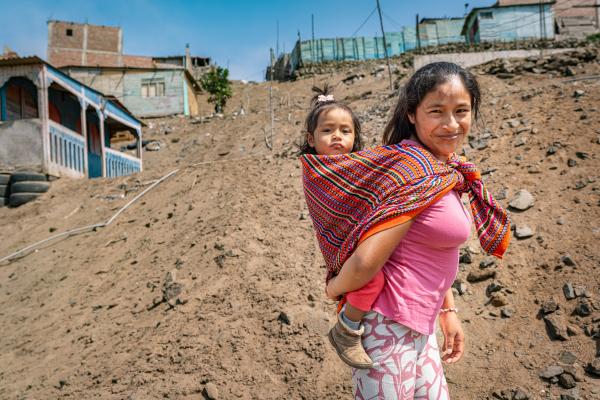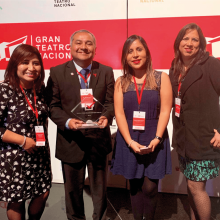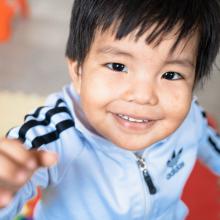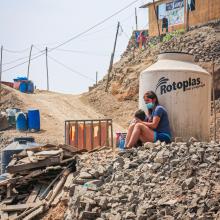One afternoon, Dina Bustilles picked up a pencil and a blank sheet of paper. She started by drawing an apple. Then came a cow, a dog, a carrot. Thus, between lines and colors, she filled the pages of a small album for her youngest daughter, barely one year and seven months old.
The task had been asked of her in one of the sessions of CASITA, an intervention of the Maternal, Infant and Adolescent Health (SAMIA) program of Socios En Salud, which aims to reduce the risk of developmental delay in children aged 6 to 24 months. Each mother or caregiver was proposed to elaborate a notebook with figures to strengthen the bond with their daughters and sons.
“I was going to print the images, but it’s hard. I’d better draw them and leave them well painted,” says Dina, as she flips through the laminated pages.
When her daughter turned one, Dina noticed that she wasn’t talking. She mentioned it during one of the check-ups at the Bahía Blanca Health Center in Ventanilla, and there she was recommended to go to the Sembrando Juntos school, one of the places where Socios En Salud has implemented its early childhood development intervention. That’s how they identified that her little girl was at risk of social and language delays.
“She likes to go. Me too, it’s given me more experience,” Dina says.
Although she doesn’t yet speak, her daughter pauses at each page of the album. She looks in awe, points to the figures, smiles. In her own way, she communicates. And for her mom, who lives with the uneasiness of that prolonged silence, seeing her react like that is a relief. A small step. A way to regain hope.
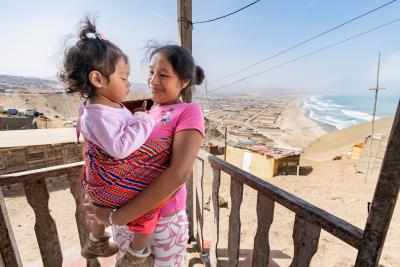
Dina carga a su hija con cariño desde lo alto de su comunidad en la costa de Lima.
Foto de Diego Diaz / SES
Growing up with CASITA
Six years ago, Dina left Huanuco to start a new life in Lima. Her husband, who works away most of the time, told her he had bought a plot of land in Ciudad Pachacutec, in Ventanilla, a district north of Callao, and asked her to move in with him. Since then, she has lived with her two daughters on top of a hill, in a wooden house overlooking the sea.
Moving from there is not easy. To go to the market, he must walk down a dirt slope, walk to the road and take a motorcycle cab. A similar journey, about half an hour, she makes every week to attend the CASITA project sessions with her youngest daughter, while her older daughter, six years old, is left in the care of a neighbor.
“It’s hard being a mom,” she acknowledges. “To take her (to CASITA), I dedicate time to myself, but sometimes there is no car, no motorcycles…”
Taking care of two girls alone is a demanding task. Her day starts at five in the morning and ends in the evening, between household chores. But on Wednesdays, at three in the afternoon, that effort finds a clear purpose: watching her youngest daughter play, laugh, paint, build with buckets.
“I like it, it makes me much happier,” Dina says.
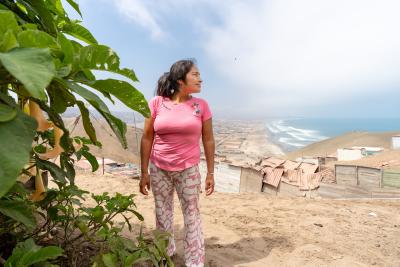
Dina Bustilles observa el horizonte desde su casa en Ventanilla. Allí, cría a su hija con el respaldo del programa SAMIA de Socios En Salud.
Foto de Diego Diaz / SES
Since 2013, this intervention of the SAMIA program has managed to reverse the risk or delay in development in 70% of the participating girls and boys, especially in areas such as language, motor skills and coordination. But the advances are not only for those who crawl or play.
For many mothers and caregivers, like Dina, the sessions also become a space for listening, trust and accompaniment with the community health agents, who are attentive to their attendance and visit them at home if they miss more than two sessions. There, they can share their doubts, talk about their difficulties and feel supported.
“At the beginning, when they first receive the sessions, many moms don’t play or sing with their babies, but later on they cheer up, share with each other, celebrate their children’s achievements and make the most of each session,” says Verónica Mondragón, a community health agent in the program.
“I believe that community accompaniment strengthens the relationship between mothers and their children because it gives them emotional security,” explains Heidi Damián, also a community agent. “The trainings and individual accompaniment we offer allow caregivers to develop skills to effectively care for and educate their children. On each visit, we also identify cases that require additional support - emotional, social or psychological - and activate the necessary networks. Because to accompany is to give health.”
This is how mothers strengthen their bonds with their daughters and sons, learn to interpret their signals, respond more confidently and celebrate each new gesture, word or look as a step forward.
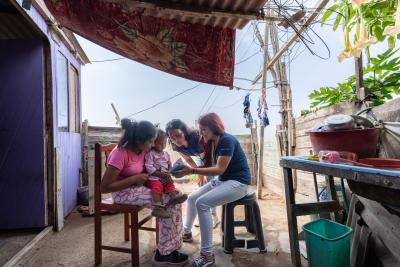
Las agentes comunitarias de salud Verónica Mondragón y Heidi Damián comparten juegos y consejos con Dina y su hija.
Foto de Diego Diaz / SES
Blossoming Motherhood
Dina admits she is not an overly affectionate mother. She believes it has to do with her own upbringing, in a household where her father did not often express affection. Still, she strives every day to parent differently. She does it with small but constant gestures: painting a notebook, walking with her daughter on her back, showing up punctually for every session.
“I want them to be professionals in the future, to study. I want them to be better than me,” she says.
Outside her house, a striking floripond, rue and papaya leaves bloom. It’s the only house in the area with plants. Dina tends them patiently. It’s a small garden that not only beautifies the space: it reflects her desire to build, with what she has, a warm environment for her girls.
Like her plants, her motherhood grows in silence. It is a form of care that is not always seen, but which takes root. Because, as she herself has learned, development also flourishes when there is someone to accompany.
Be part of the change. Receive in your inbox our actions, stories and opportunities to transform lives. Subscribe here and join our movement for health!
